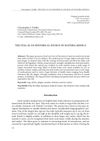 4 citations,
August 2017 in “International journal of molecular sciences”
4 citations,
August 2017 in “International journal of molecular sciences” The conclusion is that Pigmented Epithelioid Melanocytoma can start from hair follicle stem cells or from a mole on the skin.
 10 citations,
January 2004 in “Dermatologic Surgery”
10 citations,
January 2004 in “Dermatologic Surgery” Storing hair follicles in special buffers with added protective substances can increase hair growth and reduce cell death.
 January 1984 in “Pediatric Dermatology”
January 1984 in “Pediatric Dermatology” The document concludes that some dermatology books are useful for their photos or specific topics, while others have limitations like poor quality images or content.
 17 citations,
August 1983 in “Australasian Journal of Dermatology”
17 citations,
August 1983 in “Australasian Journal of Dermatology” The review says skin conditions with sterile pustules need more research for better treatments.
 37 citations,
January 2010 in “International Journal of Trichology”
37 citations,
January 2010 in “International Journal of Trichology” Bimatoprost helped eyelash growth in nearly half of the patients with a type of eyelash hair loss.
 25 citations,
July 2017 in “Archives of Dermatological Research”
25 citations,
July 2017 in “Archives of Dermatological Research” Herbal products might promote hair growth with fewer side effects, but more research is needed to confirm their safety and effectiveness.
 159 citations,
March 2014 in “Journal of The American Academy of Dermatology”
159 citations,
March 2014 in “Journal of The American Academy of Dermatology” Some skin medications are safe during pregnancy and breastfeeding, but others can harm the baby and should be avoided.
 9 citations,
February 2014 in “Tissue Engineering and Regenerative Medicine”
9 citations,
February 2014 in “Tissue Engineering and Regenerative Medicine” Conditioned media from human amniotic fluid-derived stem cells helps skin heal and protects against aging from sun exposure.
 February 2014 in “Harvard University Press eBooks”
February 2014 in “Harvard University Press eBooks” The document describes how hair and plants are symbolically linked in Indo-European traditions, leading to practices like burying hair to promote plant growth and using plants to treat baldness.

Penicillamine can cause taste problems due to copper loss, which can be fixed with copper or zinc supplements.
 26 citations,
March 2014 in “Journal of cutaneous medicine and surgery”
26 citations,
March 2014 in “Journal of cutaneous medicine and surgery” Topical vitamin D is useful for some skin conditions but not effective for others, and more research is needed.
2 citations,
July 2017 in “Oncology Letters” Lacking cyclin D3 reduces skin cancer growth without affecting normal skin cell growth.
 14 citations,
July 2017 in “Monatshefte für Chemie - Chemical Monthly”
14 citations,
July 2017 in “Monatshefte für Chemie - Chemical Monthly” Analytical chemistry helps understand the makeup and use of ancient medicines, but it's complex and challenging.
 1 citations,
February 1976 in “JAMA”
1 citations,
February 1976 in “JAMA” Haloperidol effectively treated hemiballismus, but spontaneous improvement wasn't ruled out; rapid weight loss can cause hair loss with good regrowth chances.
 1 citations,
July 1973 in “British Journal of Dermatology”
1 citations,
July 1973 in “British Journal of Dermatology” The document concludes that secondary syphilis cases are increasing and often misdiagnosed, pityriasis rubra pilaris can be distinguished from psoriasis by skin cell features, and different skin layers produce specific components during skin repair.

Most people with Raynaud's won't get serious diseases, but doctors should watch for signs over time; also, quick weight loss can cause hair loss.
 April 2022 in “Medicinus”
April 2022 in “Medicinus” Effective treatments for common hair loss are limited and may have side effects, leading to patient disappointment and treatment discontinuation.
 50 citations,
July 1996 in “Fertility and Sterility”
50 citations,
July 1996 in “Fertility and Sterility” Finasteride effectively treats hirsutism in women, but more research needed for long-term results.
 160 citations,
January 2014 in “Seminars in cell & developmental biology”
160 citations,
January 2014 in “Seminars in cell & developmental biology” Early development of hair, teeth, and glands involves specific signaling pathways and cellular interactions.
 March 2024 in “PLoS medicine”
March 2024 in “PLoS medicine” Physical activity, height, and smoking affect prostate cancer risk.
March 2024 in “Current issues in molecular biology” Personalized medicine in dermatology uses molecular biomarkers to improve diagnosis and treatment but needs further advancements for practical use.
 January 2023 in “Acta historiae medicinae stomatologiae pharmaciae medicinae veterinariae”
January 2023 in “Acta historiae medicinae stomatologiae pharmaciae medicinae veterinariae” Stag parts were historically used in medicine for various health issues.
 9 citations,
June 1998 in “Dermatologic Surgery”
9 citations,
June 1998 in “Dermatologic Surgery” The Rapid Fire Hair Implanter Carousel may allow faster hair transplants with less bleeding and similar healing and growth compared to manual methods.
 7 citations,
May 2012 in “Actas Dermo-Sifiliográficas”
7 citations,
May 2012 in “Actas Dermo-Sifiliográficas” Scalp fungus infections in Spain are a health concern, with changing causes and a need for better treatment and prevention.
 2 citations,
January 2014 in “Springer eBooks”
2 citations,
January 2014 in “Springer eBooks” The book details skin conditions in older adults, their link to mental health, cancer treatment importance, hair loss remedies, and managing autoimmune and itchy skin.
 1 citations,
July 2023 in “Journal of Clinical Medicine”
1 citations,
July 2023 in “Journal of Clinical Medicine” Different causes of beard hair loss have various treatments, including medications, lifestyle changes, and procedures to stimulate hair growth.
 1 citations,
April 2023 in “Frontiers in Immunology”
1 citations,
April 2023 in “Frontiers in Immunology” New treatments for hair loss from alopecia areata may include targeting immune cells, using stem cells, balancing gut bacteria, applying fatty acids, and using JAK inhibitors.
51 citations,
January 2014 in “International journal of trichology” Shampoo pH can affect hair health, with alkaline shampoos potentially causing damage and acidic shampoos reducing frizz.
1 citations,
November 2013 in “Actas dermo-sifiliográficas/Actas dermo-sifiliográficas” Experts met to improve care for ichthyosis patients in Spain.
 March 2013 in “Actas Dermo-Sifiliográficas”
March 2013 in “Actas Dermo-Sifiliográficas” The document concludes that there have been significant improvements in diagnosing and treating skin diseases, including melanoma, with new techniques and therapies.

























